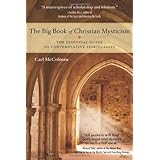
Average Reviews:

(More customer reviews)Are you looking to buy The Big Book of Christian Mysticism: The Essential Guide to Contemplative Spirituality? Here is the right place to find the great deals. we can offer discounts of up to 90% on The Big Book of Christian Mysticism: The Essential Guide to Contemplative Spirituality. Check out the link below:
>> Click Here to See Compare Prices and Get the Best Offers
The Big Book of Christian Mysticism: The Essential Guide to Contemplative Spirituality ReviewI read Carl McColman's The Big Book of Christian Mysticism: The Essential Guide to Contemplative Spirituality (2010, Hampton Roads Publishing) while on a long flight from Singapore to South Africa, and reflected on the book while I was on safari in Kruger National Park. Amidst the raw chill of a morning on the African savannah plain while watching a glorious sunrise, adoration for the divine fills my heart, and I had a glimpse of what the mystics of all ages have been trying to explain to us. It resonates with what McColman writes about Christian mysticism,"Christian mysticism is all about experience - the experience of union with God, or of God. But it is also about a spiritual reality that undermines experience itself, deconstructing all your masks and self-defen[c]es (sic) and leaving you spiritually naked and vulnerable before the silence of the Great Mystery. It is the spirituality of bringing heaven to earth, and of going through hell while here on earth in order to get to heaven" (p.9).McColman structures his book into two parts. The first part explains what mysticism especially Christian mysticism is and the second is how to be a mystic through a contemplative life. The book is written in such an easy to understand way that a reader may easily miss how much knowledge and experience is needed to make such a complex subject appear simple. I discern that McColman has depth knowledge of many of the Christian mystics, notably Meister Eckhart, Julian of Norwich, Bernard of Clairvaux, author of the Cloud of Unknowing and Hildegard of Bingen.
McColman's writing reflects the output of a gentle and kind soul who wants to share what he knows but is fearful of the repercussions. He walks gingerly through the minefield of what we commonly called mysticism. He is wise to limit himself specifically to Christian mysticism. Even then, he is aware of many well meaning Christians to whom the word mysticism is synonymous with New Age, not realising many Old and New Testament heroes of the faith may be considered mystics. I appreciate the way he grounds Christian mysticism in the Trinity, the revelation of God in his word (Bible), the Mystery of the Divine and in community. It is not often that mystics are understood in the context of their communities.
The second part deals with the heart of mysticism which involves kenosis (self-emptying) and perichoresis (analogy of the divine dance of the Trinity) which McColman calls the contemplative life. He introduces certain spiritual disciplines such as lectio divina (spiritual reading) and prayer-beyond-words which prime us to the contemplative life.
The heart of the book is what he calls the "mystical paradoxes." The mark of spiritual maturity is to be able to hold in tension two seemingly opposing spiritual truths and yet be at peace about it. This is Christian mysticism. Unlikely systematic theology which gives the illusion that everything can be neatly explained in propositions, mysticism reveals that God is still a Mystery to our finite mind. McColman notes that "[a] God that you cannot comprehend is a God you cannot manipulate. This, I believe, is a God of true grace, a God worthy of worship" (p.77).Obviously those "mystical paradoxes" needs to be unpacked to do them justice and understandably McColman will not be able to do that even in his "big" book of 309 pages. The only fault I can find (aside from the pagination) is that this "big" book is not big enough! It would have been evenbetter if McColman expands more than what he has already done on these "mystical paradoxes."
This is a good introductory book to Christian mysticism. Reading from the perspective of the Reformed/Presbyterian tradition, I do not have any issues with what McColman has written here. Christian mysticism is an essential part of the Christian spiritual life and I agree with McColman here that everyone is a mystic (see also Paul's writing in Ephesians 3). It will leave us with a truncated spiritual life if we neglect or reject this facet of our Christian spirituality.
The Big Book of Christian Mysticism: The Essential Guide to Contemplative Spirituality Overview
Want to learn more information about The Big Book of Christian Mysticism: The Essential Guide to Contemplative Spirituality?
>> Click Here to See All Customer Reviews & Ratings Now
0 comments:
Post a Comment